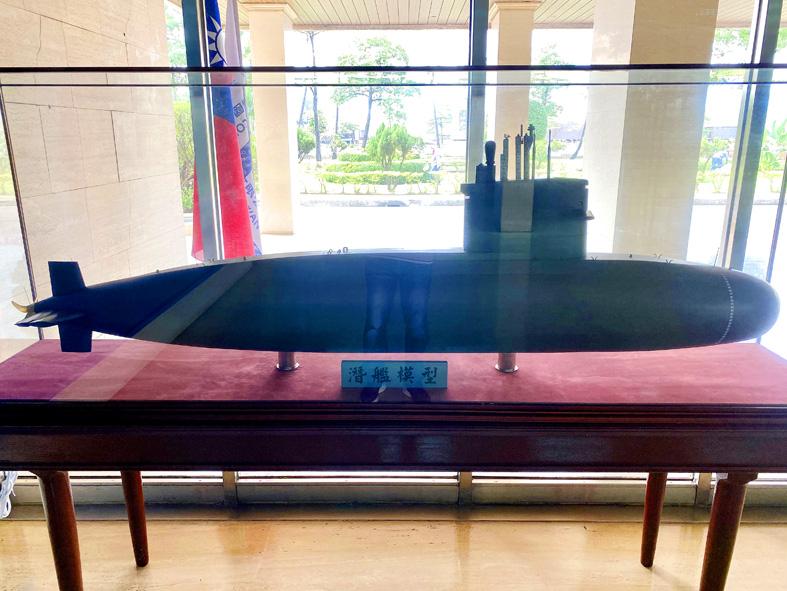A shortage of experts has impeded the development of the military’s indigenous submarine prototype, an advanced trainer jet and an F-16 modernization program, a Ministry of National Defense official said on Friday.
The official made the remarks on condition of anonymity amid an initiative by the ministry to recruit more foreigners with technical expertise to work in Taiwan’s defense sector.
Another source of strain is that foreign technicians and advisers must depart from the country after completing their contract, resulting in constant disruptions, the official said.

Photo: Hung Chen-hung, Taipei Times
The ministry has identified avionics and shipbuilding, as well as shipborne weapons and equipment, and naval platform design, as areas with urgent need of fresh talent, the official said, without elaborating on how much newly hired foreigners would earn and what benefits they would receive.
However, the ministry would try to make their employment packages as attractive as possible, the official added.
“The ministry is offering qualified foreign experts high salaries to make sure that indigenous ship and aircraft programs will meet their delivery schedule, and targets for quality and quantity,” they said.
A preview of the policy showed that foreigners would be allowed to work in the sector if they have a doctorate or equivalent degree in a relevant field, as well as at least five years of experience in military aeronautics or shipbuilding.
The degree requirement would be waived for applicants for positions that Taiwan has problems filling, such as specialists in aviation mechanical or electrical engineering, process engineering, project management, or research and development, it showed.
Also exempt would be specialists with five years of experience in shipborne weapons, equipment and platform design, including performance, structure, propulsion, electrical systems, command and control, auxiliary machinery and outfitting, the document showed.
The positions that could be filled by foreigners would be identified by the ministry or other defense-related agencies based on urgency, it showed.

The Central Election Commission has amended election and recall regulations to require elected office candidates to provide proof that they have no Chinese citizenship, a Cabinet report said. The commission on Oct. 29 last year revised the Measures for the Permission of Family-based Residence, Long-term Residence and Settlement of People from the Mainland Area in the Taiwan Area (大陸地區人民在台灣地區依親居留長期居留或定居許可辦法), the Executive Yuan said in a report it submitted to the legislature for review. The revision requires Chinese citizens applying for permanent residency to submit notarial documents showing that they have lost their Chinese household record and have renounced — or have never

A magnitude 5.6 earthquake struck off the coast of Yilan County at 12:37pm today, with clear shaking felt across much of northern Taiwan. There were no immediate reports of damage. The epicenter of the quake was 16.9km east-southeast of Yilan County Hall offshore at a depth of 66.8km, Central Weather Administration (CWA) data showed. The maximum intensity registered at a 4 in Yilan County’s Nanao Township (南澳) on Taiwan’s seven-tier scale. Other parts of Yilan, as well as certain areas of Hualien County, Taipei, New Taipei City, Taoyuan, Hsinchu County, Taichung and Miaoli County, recorded intensities of 3. Residents of Yilan County and Taipei received

Taiwan has secured another breakthrough in fruit exports, with jujubes, dragon fruit and lychees approved for shipment to the EU, the Ministry of Agriculture said yesterday. The Animal and Plant Health Inspection Agency on Thursday received formal notification of the approval from the EU, the ministry said, adding that the decision was expected to expand Taiwanese fruit producers’ access to high-end European markets. Taiwan exported 126 tonnes of lychees last year, valued at US$1.48 million, with Japan accounting for 102 tonnes. Other export destinations included New Zealand, Hong Kong, the US and Australia, ministry data showed. Jujube exports totaled 103 tonnes, valued at

BIG SPENDERS: Foreign investors bought the most Taiwan equities since 2005, signaling confidence that an AI boom would continue to benefit chipmakers Taiwan Semiconductor Manufacturing Co’s (TSMC, 台積電) market capitalization swelled to US$2 trillion for the first time following a 4.25 percent rally in its American depositary receipts (ADR) overnight, putting the world’s biggest contract chipmaker sixth on the list of the world’s biggest companies by market capitalization, just behind Amazon.com Inc. The site CompaniesMarketcap.com ranked TSMC ahead of Saudi Aramco and Meta Platforms Inc. The Taiwanese company’s ADRs on Tuesday surged to US$385.75 on the New York Stock Exchange, as strong demand for artificial intelligence (AI) applications led to chip supply constraints and boost revenue growth to record-breaking levels. Each TSMC ADR represents